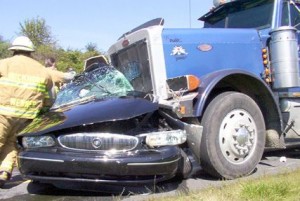Top 10 things to do if you are injured by a product:
by Daryl L. Derryberry, Member of Derryberry Zips Wade Lawhorn, PLLC

Defective tires de tread frequently and can cause serious injuries or death to the occupants of the vehicle.
- Contact a lawyer immediately to prevent the product from being destroyed or disposed of. An attorney can send a spoliation letter to preserve the product for inspection which is crucial to your case. Do not sign any documents prior to consulting with an attorney.
- Obtain the name of the product manufacturer and the make and model number of the product.
- Send all worker’s compensation forms, if any, to your lawyer before signing.
- Take photographs of your injuries if possible.
- Take photographs of the scene of the incident if possible.
- Do not give any written or recorded statements to any insurance company or company representative without consulting with an attorney.
- Immediately seek medical attention at a hospital or from a doctor if you are injured. If you do not seek medical attention, then the insurance company and/or product manufacturer will contend that you delayed in treatment and are not injured.
- If you do not have health insurance, contact an attorney. We may be able to assist you in obtaining medical care.
- Prepare a brief summary of the incident. Our memories fade about the details of an accident as time passes. This is helpful later in jogging your memory of the details of the incident.
- Obtain a police report if one is available.
 Daryl L. Derryberry is one of the two founding partners of the firm now known as Derryberry Zips Wade Lawhorn, PLLC (the “Firm”). Daryl and Craig Zips started the Firm in May, 2002 and have enjoyed great success since the Firm’s inception. Daryl’s legal career spans two decades and includes successfully securing jury verdicts and settlements on behalf of his clients in oil rig accidents, 18 wheeler wrecks, medical negligence, products liability, broker malpractice, breach of fiduciary duty and other cases.
Daryl L. Derryberry is one of the two founding partners of the firm now known as Derryberry Zips Wade Lawhorn, PLLC (the “Firm”). Daryl and Craig Zips started the Firm in May, 2002 and have enjoyed great success since the Firm’s inception. Daryl’s legal career spans two decades and includes successfully securing jury verdicts and settlements on behalf of his clients in oil rig accidents, 18 wheeler wrecks, medical negligence, products liability, broker malpractice, breach of fiduciary duty and other cases.
TO STAY UP TO DATE WITH THE LATEST LAW NEWS, BE SURE TO FIND US ON FACEBOOK AT https://www.facebook.com/dzwlaw AND FOLLOW US ON TWITTER AT https://twitter.com/DZWLAW and https://twitter.com/URHURT
DERRYBERRY ZIPS WADE LAWHORN, PLLC http://www.dzwlaw.com and http://www.urhurt.com



